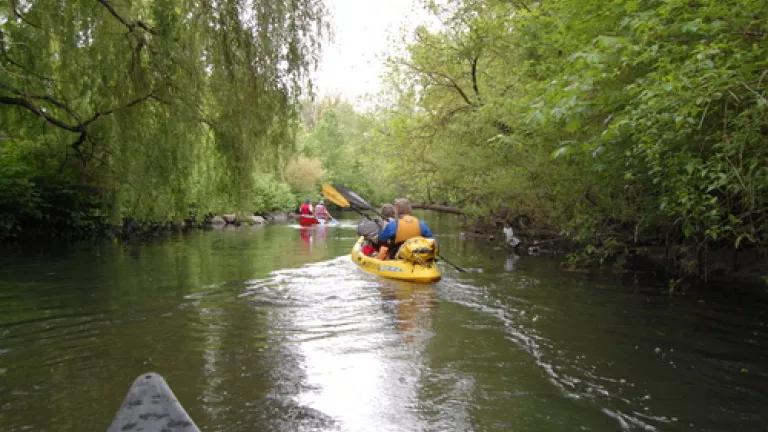New York's High Court to Rule on Cleanup Requirements for Hundreds of Rivers, Bays, Lakes

Long Island Sound, the Bronx River, Lake Ontario, Lake Erie, and South Oyster Bay all share something in common - and this is not a club you'd want to join. According to New York State's Department of Environmental Conservation (DEC), they are so fouled with polluted runoff from cities and urban runoff that you may get sick if you swim there or touch the water.
Kayakers participating in the 2012 "Amazing Bronx River Flotilla" organized by the Bronx River Alliance. Photo credit: Larry Levine, NRDC.
What's worse is that the state is falling down on its job to clean them up. Although DEC is charged with restoring those waters by regulating pollution sources, the state environmental agency has instead said the following to the municipalities whose runoff is fouling these waterways:
- Develop your own runoff pollution control plan, with your own goals, and go implement it. You don't need to show it to us first, and we won't review it to tell you if it's strong enough to meet legal standards.
- Whatever you do, make sure you don't make things any worse than they already are.
- You don't have to do any water quality monitoring to evaluate whether your pollution controls are working.
The highest state court in New York will soon rule on whether this scheme violates the federal Clean Water Act and state environmental protection laws.
And the water bodies highlighted above are hardly the only ones at issue. The case concerns the legality of state rules governing the state's most pervasive source of water pollution. The health of hundreds of New York's rivers, streams, lakes, and bays - and the people who use and enjoy them - is at stake.
Five years ago, NRDC took DEC to court because the agency has been allowing polluted runoff from cities and suburbs to foul hundreds of waterways. While the case has been pending, DEC's own studies show, the situation hasn't gotten any better. The list of waters fouled by urban runoff is only growing.
Instead of continuing the failed approach of the past, the state should be holding municipalities accountable for cleaning up their pollution. That means requiring cities and towns to boost their pollution prevention measures. The most effective (and cost-effective) of those is green infrastructure, which includes things like green roofs, street trees, and porous pavement that soak up rain where it falls. This prevents urban runoff before it starts, so it doesn't carry pollution into local waters in the first place - keeping our waters clean and safe for people and critters.
Our case has been making its way through the state courts - including a lower court victory in 2012, which was later reversed in the first round of appeals - and is now in the hands of the New York Court of Appeals. The high court heard oral argument late last month, and a decision is expected in the coming weeks, likely by the end of April.
The case concerns a permit that regulates pollution from municipal sewer systems in over 500 cities, towns, and villages across New York state. Every time it rains, pollution from developed areas - like streets, parking lots, driveways, rooftops, and chemically-treated lawns - is washed into these sewers and dumped directly into local waterways without any treatment.
Permits like the one we challenged in this case are issued so that municipalities are required to take steps to reduce their runoff pollution. State and federal law establish standards for these permits. The permits must ensure that stormwater pollution is reduced to the "maximum extent practicable" and, moreover, that such pollution does not exceed pollution limits DEC has assigned to each waterbody in the state to protect our waters for fishing, swimming, drinking, and wildlife. We've explained in our legal briefs why New York's permit fails to meet these standards.
NRDC, along with a coalition of environmental groups throughout the state (including Riverkeeper, Waterkeeper Alliance, Soundkeeper, Save the Sound, Peconic Baykeeper, NY/NJ Baykeeper, and Hackensack Riverkeeper), brought this lawsuit five years ago because we believed that New York deserves better. We still do. We're hopeful that the state Court of Appeals will agree and soon tell DEC that it must do better.
But that doesn't mean our work will be over. Even if the Court of Appeals sides with us in its decision, DEC will have to implement the ruling by issuing a new permit - and we'll be following that process very closely to make sure the court's instructions are followed.
Stay tuned here, and to my colleague Larry Levine's blog, for an update when the court issues its decision.

